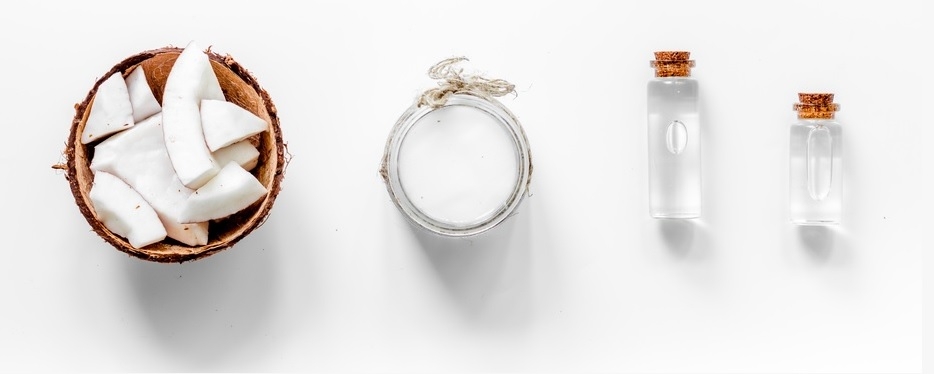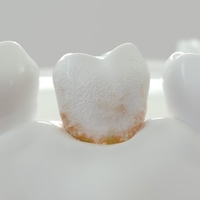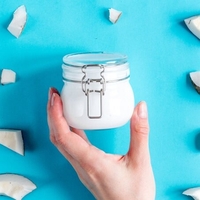Treatment Options
Antimicrobial
VCO may be used as a topical antibacterial agent and it is used as an efficient and safe skin moisturiser (1,2). Caprylic acid (400-500 mg) may be beneficial in treating infections such as C. albicans and Chlamydia (3).
Oral health (Oil pulling)
Oil pulling with coconut oil over a 7 day period is helpful in decreasing plaque formation and plaque induced gingivitis (4,5). It can reduce S. mutans and Lactobacillus counts in saliva (6) and may be as effective as chlorhexidine, the gold standard antibacterial mouthwash (7,8). Oil pulling, when performed as recommended, can be safely used as an adjunct to maintain good oral hygiene and health along with routine tooth brushing and flossing (9).
Hair health
Coconut oil reduces the protein loss in both damaged and undamaged hair when used as a pre-wash and post-wash grooming product. Due to its high lauric acid content, coconut oil has a high affinity for hair proteins, and because of its low molecular weight and straight linear chain it is able to penetrate inside the hair shaft and prevent damage to the cuticle (10).
Skin health
Virgin coconut oil (5 mL) applied topically twice a day may improve symptoms in mild atopic dermatitis. Massage the oil gently but thoroughly into the skin (11,12).
Dosage
While the most appropriate beneficial dose of coconut oil is unknown (13), most studies use approximately 30 mL/day (2 tablespoons).
Cooking with coconut oil
The high content of lauric acid in coconut oil makes it highly resistant to oxidation and it produces low levels of polar compounds, making it stable at high temperatures (14).
Table 1. Coconut oil extraction methods
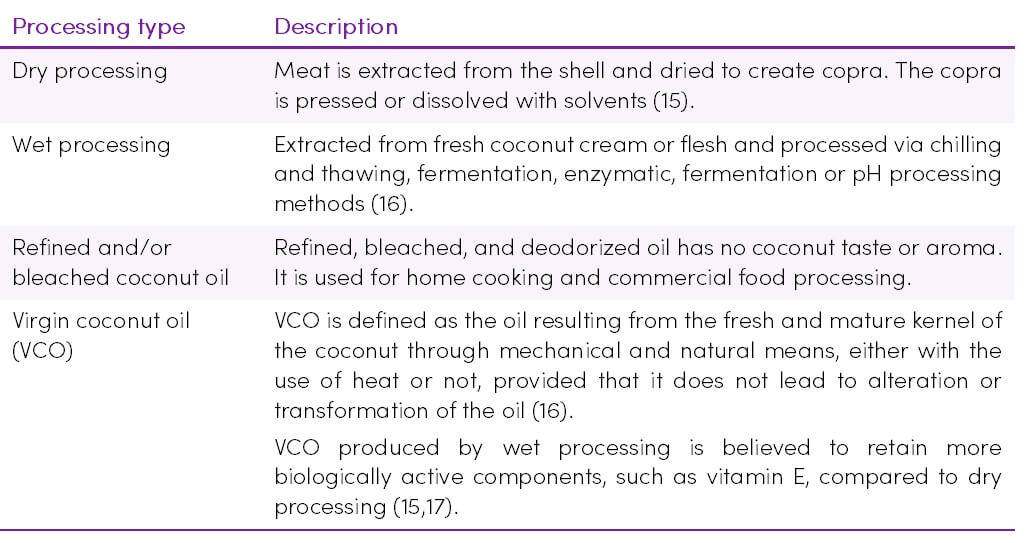
Absorption/Mechanism of Action
Lauric acid can be classified as either a MCFA or a LCFA (18):
- In terms of digestion and metabolism it behaves more as an LCFA because the majority of it is absorbed with chylomicrons
- By comparison, 95% of MCFAs are absorbed directly into the portal vein
This complexity might explain discrepancies in studies between MCT oil and coconut oil in terms of differences found in production of ketone bodies.
Coconut oil, because of its high lauric acid content, can therefore be classified as either an MCFA or an LCFA.
Table 2. Medium chain fatty acids (MCFAs) vs. Long chain fatty acids (LCFAs)
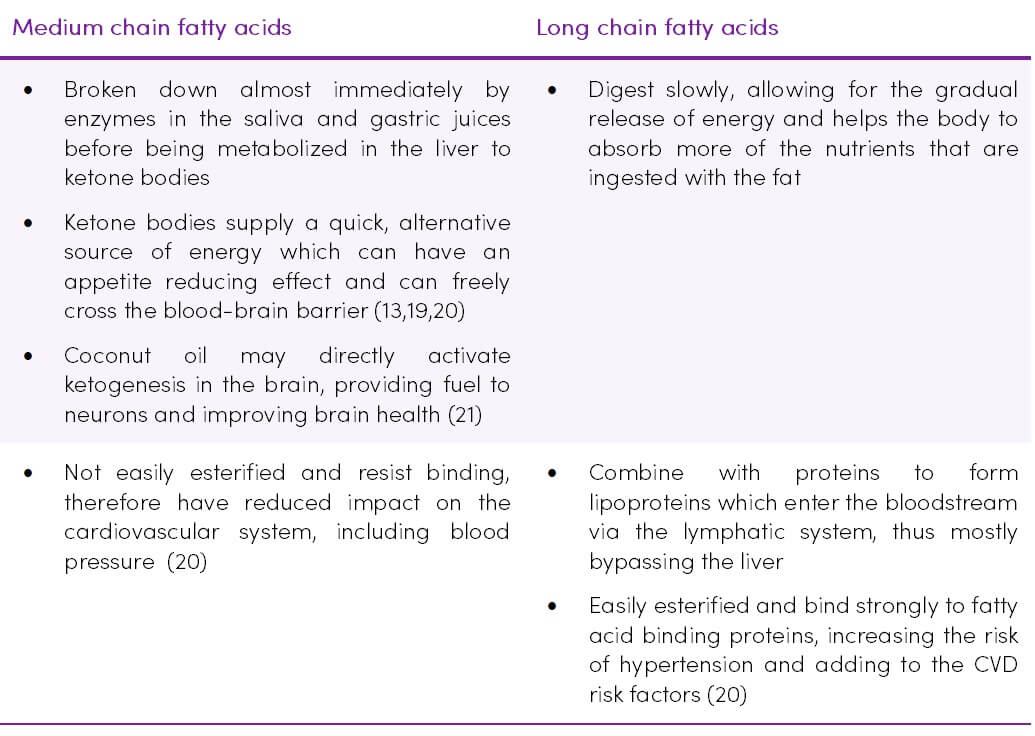
The biological efficacy of VCO is thought to be due to its high polyphenol content such as caffeic acid, tocopherol, quercetin, methyl catechin, ellagic acid and ferulic acid (which has been shown to inhibit amyloid-β deposition in the brain) (22,23). Preliminary data shows that ketones and coconut oil may reduce symptoms of AD (24–26).
VCO protects skin via its anti-inflammatory and skin barrier functions (Figure 1).
Figure 1. Skin protective properties of virgin coconut oil (27) CC BY-NC-ND
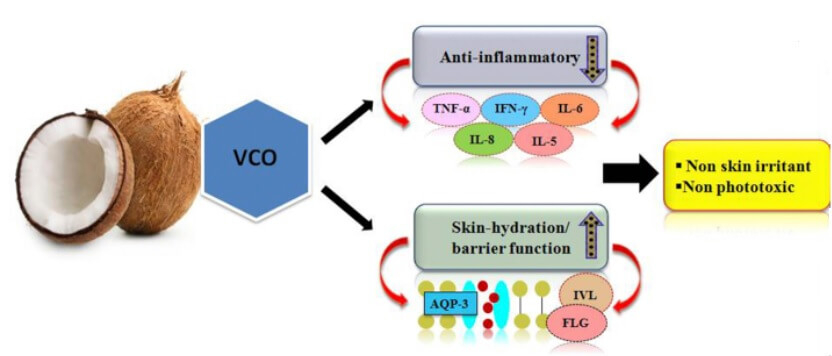
Cautions/Contraindications
Adverse effects from coconut oil are not well reported. Some areas of concern are outlined below.
Cardiovascular disease (CVD) risk
Controversy has arisen over the potential of coconut oil to adversely affect cholesterol levels and consequent CVD risk profile due to its high saturated fat content (28). Lauric acid is shown to increase blood cholesterol levels, but this is mostly due to an increase in HDL cholesterol (29) which, relative to total cholesterol, has been associated with a reduced risk of heart disease (30,31). Recent evidence supports the notion that saturated fat is not associated with CVD risk factors (32,33,34,35). A 2016 study found that cooking with coconut oil did not change the lipid-related CVD risk factors and events in patients with coronary heart disease (36).
Endotoxaemia
Evidence indicates that even one meal high in saturated fat (e.g. 16g (4 teaspoons) of coconut oil) is associated with increased plasma endotoxin lipopolysaccharide (LPS) concentration (37–39), indicating increased postprandial inflammation and intestinal permeability, endothelial activation and altered microbiota composition (40,41,42,43,44).
Weight gain
Coconut oil is still high in calories and it is recommended to replace unhealthy fats with coconut oil. The MCT may boost metabolism slightly, however, long term consumption of more calories than are needed could lead to weight gain (45).
Ulcerative colitis flares
High dietary intake of myristic acid (found in coconut oil) is associated with a dose-response increased risk of disease flares in patients with ulcerative colitis undergoing treatment with aminosalicylates. The disease flares occurred within 12 months of intake (46).
There do not appear to be any drug interactions with coconut oil (13).
Takeaway on Coconut Oil
- Coconut oil consumption is non-toxic, and shows many promising health benefits including managing weight, cardiovascular disease risk, seizures, brain function, skin and hair health, oral health and as an antimicrobial
- It should be used in moderation to replace less healthy fats in the diet
- The extraction method used to obtain VCO affects the quality of the coconut oil and may directly affect the efficacy
- Due to inconsistencies in the evidence it is suggested that further research needs to be undertaken before broadly advocating the use of coconut oil

